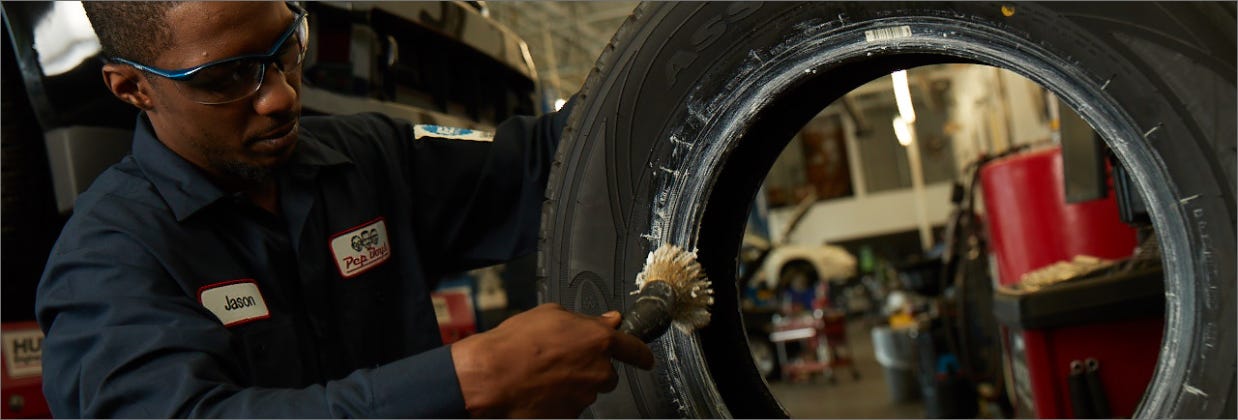The Web Link In Between Tire Solution and Gas Efficiency
Performance in fuel consumption is a vital concern for vehicle proprietors looking for to maximize their driving experience. Amongst the numerous elements that affect gas efficiency, tire service stands apart as a crucial aspect that typically goes overlooked. The elaborate partnership in between tire maintenance and fuel economy is a testament to the intricate operations of an automobile. By comprehending just how tire treatment directly influences the effectiveness of your car, you can open a world of possibilities that not just enhance efficiency but likewise contribute to set you back financial savings in the long run.
Importance of Proper Tire Inflation
Appropriate tire rising cost of living is an essential aspect in optimizing gas performance and making sure ideal automobile efficiency. When tires are underinflated, it creates extra moving resistance, creating the engine to function more difficult and melt even more gas to preserve the very same speed. On the other hand, overinflated tires can cause a harsher ride, unequal tire wear, and lowered traction. To locate the suggested tire pressure for your lorry, refer to the proprietor's guidebook or the sticker label located on the vehicle driver's side door jamb.
Keeping the proper tire pressure not only enhances gas efficiency yet additionally improves driving security. Routinely examining and changing tire stress, especially in the past long journeys, is an easy yet effective way to enhance your vehicle's fuel economy and ensure a smooth driving experience.
Impact of Tire Footstep Depth
Preserving the advised tire pressure is essential for ideal vehicle performance and gas efficiency; likewise, the walk deepness of your tires plays a vital role in ensuring safety and security and grip when driving. Tire tread deepness directly affects the capacity of your tires to grasp the roadway surface area, particularly in wet or slippery problems. As tires put on down, their tread depth reductions, affecting their capacity to network water away and preserve appropriate call with the road. The recommended minimum walk deepness is generally 2/32 of an inch, however, for enhanced safety and efficiency, numerous professionals suggest altering tires before they reach this factor. Correct step deepness not only ensures better handling and stopping yet likewise adds to fuel effectiveness by reducing moving resistance. Regularly examining your tire walk depth and replacing tires when essential is a simple yet reliable method to advertise both safety and gas effectiveness when traveling.
Duty of Wheel Alignment in Performance
Ensuring accurate wheel positioning is essential for optimizing car efficiency and making best use of gas economic situation. Appropriate wheel placement involves changing the angles of the wheels to manufacturer specs, making certain that they are identical to each various other and perpendicular to the ground. When wheels are misaligned, it can bring about unequal tire wear, boosted moving resistance, and reduced gas performance.

Additionally, accurate wheel placement can additionally improve taking care of and security, lowering the amount of energy required to navigate the car (tire shop near me). By minimizing unneeded friction and drag, proper wheel placement plays a crucial duty in improving overall lorry effectiveness my site and gas economic climate. Regular wheel positioning checks and modifications are essential for maintaining optimum efficiency and making the most of fuel cost savings
Link Between Tire Maintenance and MPG
A vital aspect of enhancing fuel performance in lorries is the upkeep of tires and their straight effect on miles per gallon (MPG) Appropriate tire maintenance plays an essential role in optimizing fuel economic climate. On the other hand, overinflated tires decrease the contact spot with the road, leading to uneven wear and lowered gas effectiveness.
Moreover, tire walk depth also affects gas performance. Worn-out footsteps reduce traction, particularly in wet problems, forcing the engine to apply more power to preserve rate. This increased resistance lead to greater gas usage. By guaranteeing tires have adequate step depth, motorists can enhance both safety and fuel economic situation.
In significance, correct tire upkeep, including monitoring tire stress and walk deepness, is straight connected to attaining optimum MPG. By including normal tire assessments and upkeep right useful site into a lorry treatment routine, chauffeurs can not only expand tire life yet additionally improve fuel performance, inevitably conserving cash Related Site and lowering environmental impact.

Tips for Fuel-Efficient Tire Care
Offered the important connection between tire upkeep and gas effectiveness, applying effective techniques for maximizing tire treatment is essential to boosting general automobile efficiency. Revolving tires at suggested periods advertises even step wear, improving fuel performance by making sure all tires contribute equally to vehicle efficiency. By integrating these fuel-efficient tire care tips into a regular maintenance routine, drivers can take full advantage of gas effectiveness, lower running costs, and extend the life of their tires.
Verdict
By on a regular basis maintaining tires and following fuel-efficient tire treatment ideas, motorists can enhance their automobile's efficiency and decrease fuel usage. It is important to focus on tire maintenance to not only conserve money on gas expenses but also to promote general lorry efficiency.